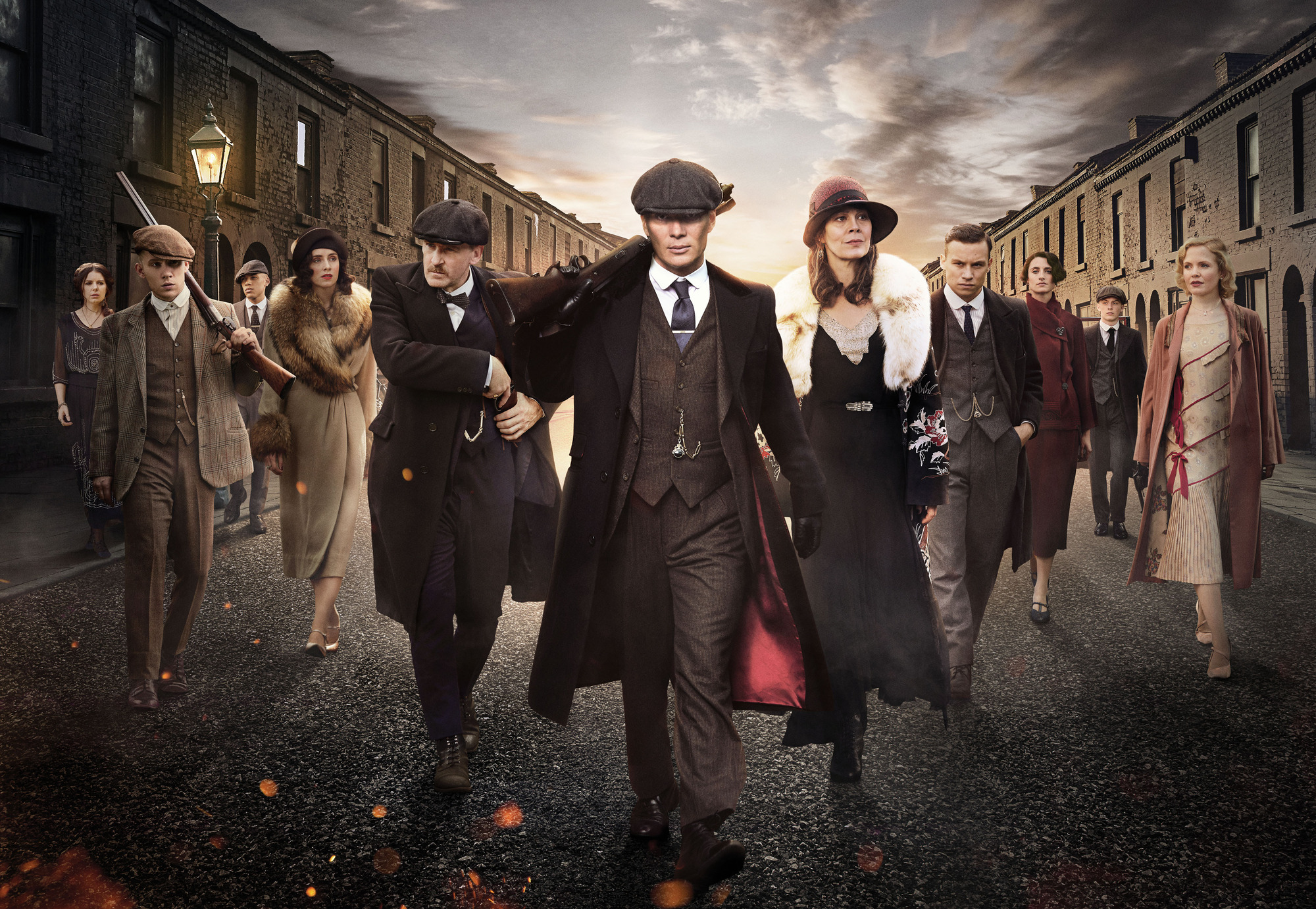Contains spoilers for Peaky Blinders series three.
“Let’s do legends”, says Steven Knight. “In Britain, when the working class are summoned for fiction, it’s ‘isn’t it a shame, isn’t it a pity, isn’t it awful, the terribly poor things…’, whereas from within, it’s nothing like that. It’s fantastic, it’s glamorous, it’s terrible and good the same as it is for everybody.”
Knight didn’t create Peaky Blinders to inspire pity; he created it to inspire awe. Not for the brutality of the Birmingham gang it depicts, but for the “beautiful, dramatic, romantic” stories of his characters’ lives. “Because to the people involved,” he tells me, “that’s exactly what it is.”
Knight, his actors, directors and crew have so far conjured up three series of that beauty and drama, with another airing next week and a fifth in the pipeline. Back in May, while series four was still filming, I spoke to Knight about the third run, future plans and the layer of symbolism running through the show.
So, series three put the Peaky Blinders in the most fascinating position yet: out of their comfort zones.
Yes.
To all intents and purposes, they’d made it – they were out of Small Heath, but that caused a sort of identity crisis in that they didn’t know who they were in the new environment?
Absolutely. The whole series is a question of can people from this background with this history escape from what they were and is it actually who they are? What I wanted to do in series three, was to show that to all intents and purposes, they’d made it but they’re uneasy, they don’t quite know who they are, what they’re meant to do and also circumstance keeps pulling them back. Things they’ve done in the past bring them back. For example, the family were obliged to help the Economic League because of the threat of retribution for all the crimes they’d committed in the past, so they’re always sort of on the hook. It’s Tommy’s job to get the family off the hook. That’s what he has been trying to do from the first episode of series one.
Which is what led to that surprise ending to series three.
Yes.
Tommy told Arthur “Trust me, brother” in that scene. Are any of the family likely to trust Tommy ever again after that stunt?
It’s difficult not to give too many things away, but as he said, there’s a plan. He did what he did for a reason. He had already made a deal which I can’t really go into. Certainly, when we join them again at the start of series four, by no means do they trust him. The whole thing was a huge, huge, huge trauma and without giving too much away at the start of series four the family are separated, they are estranged from each other.
Understandable! In that scene, Tommy gave a great speech where he reasserted who he was. He’d realised he’d always be seen as a thug from the Garrison no matter how big a house he had. Is that the Tommy we meet in series four? He’s back to knowing who he is?
He is. He is going through various stages of self-realisation if you like—without wishing to use words that of course the Peakies would never use!—he tried to get respectability to begin with and legitimacy, he learns by the end of series three he’s never going to get that. However, he can get the trappings of it, he can get the money and the house and the land, and that’s not a bad thing, that’s okay.
I suppose you’d say at the start of series four, almost out of spite Tommy is acquiring money to prove that point, to prove ‘I can get this, I’ve got more than them’. There’s a line in series three about them having “more money than all those toffs put together” when he’s got all of that cash. For Tommy, it’s ‘look at the bank balance and that’s how respectable I am’. He knows he’s never going to get that other thing and at the end of series three, he doesn’t care.
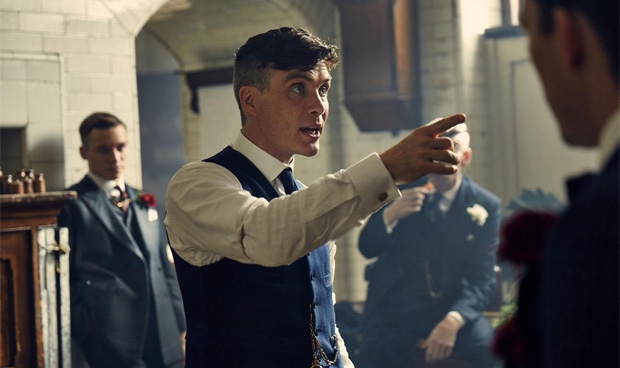
Because he’s come to terms with that, does it make Tommy an even more dangerous, formidable character in series four?
Absolutely, because he’s not distracted. He’s not going to apply to join the local hunt [laughs], which was always the sign of new money trying to get respect of the aristocracy. He’s not going to do that!
With Tommy, it’s always been about whether or not he has something to lose. The first episode of series three was the first time I felt he was truly, truly terrified because he did have something to lose.
Exactly. And he’s still got his son so he does have that to lose. I think by series four he’d learnt the lesson that that’s a weak point and he’ll protect it in future, that’s a lesson learned so that’s not going to happen again. In series four he gets confronted with a threat that is greater than any threat he’s faced so far.
There’s your poster quote!
[Laughs]
On the subject of the family’s identity crisis, I was interested in a line in series three from Arthur after he and John refuse to kill Mrs Changretta when he told Tommy “That’s not the kind of men we are”. What kind of men does Arthur think they are?
Well, Tommy was driven by vengeance after Grace was killed and he was just furious and happy to give the order that [Mrs Changretta] would be shot as well. At the same point as that line was delivered, Tommy says about the razorblades, ‘get rid of them for good’ in other words, they’re not brutal, random killers, they’ve been promoted a division into what you would think of as organised criminals. Tommy hopes their criminality would become shop practice and then would become conventional business, which is a route a lot of people have taken who have made empires. It’s the Joseph Kennedy route, if you like. But I think as you’ll see, again, without wishing to give anything away too much, is that one noble gesture of Arthur has consequences.
In terms of location, that stately home in series three created a real sense of formality and symmetry which, thematically, was at a real contrast with the chaos of the characters’ lives. Was that part of the idea in bringing them out of Small Heath?
What I wanted to do was reflect on the idea that those big stately homes, when they were first built by people in the fifteenth or sixteenth century, they were usually built by pretty much criminals who had done pretty bad things in order to get their knighthoods and their land from the king. They were pretty violent men who formed the aristocracy and built those big houses that we now think of as so genteel. They’re actually built on blood. When they moved in, they had statues of themselves and portraits of themselves all over the house, it was massive, vulgar vanity that now, because it’s been burnished through hundreds of years of time, seems like class. Tommy does exactly that. He’s built his empire on violence and blood and he moves in, puts a massive painting of himself and his horse and his wife all over the house and he’s just doing what the previous aristocracy did, but just as with the existing aristocracy, that symmetry and order that you’re talking about, which is absolutely right, in the house and the architecture, even then was never mirrored by any sort of balance and symmetry within aristocratic families, famous as they were. The chaos is… you never felt Tommy was at peace in that house.
You mention Tommy’s portraits there, I loved the storyline with Polly’s portrait for the vulnerability it brought out in her, which is always when Helen McCrory is most powerful.
Absolutely.
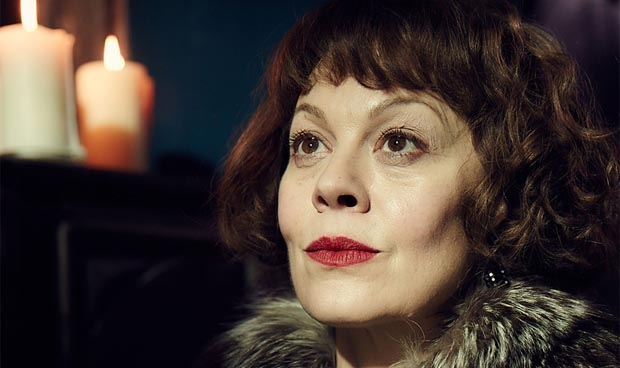
And the way Polly protected her feelings about murdering Campbell onto the painting, eventually slashing it with all that self-hatred coming out. Is there more to say about that?
What I try and do is imagine real, real progression instead of what you might think would be a typical progression of a character in fiction. I want Polly to go in certain directions and then come back again, and try things that don’t quite work. At that point, just as Tommy was dabbling with the idea of fake aristocracy, Polly was dabbling with bohemian respectability and realising that in fact, she was just a talking point and a novelty.
In the twenties, there was a lot of that about, usually with male gangsters, but they were invited to all the best parties because it was considered to give a frisson to the whole event. Polly realises that, she’s not stupid. She’s not educated, which of course is a great source of uncertainty for her but I think she learns quite quickly that education isn’t intelligence and that she is a match for any of them. The circumstances of series four explore an even deeper level. With Polly in series four it’s one of the deepest mines that I have done yet in terms of the characters of Peakies, definitely, because her journey in four is quite intense, very intense.
That’s music to my ears.
[Laughs]
I’m still holding out for her drunken Bullring speech at the women’s strike to be released as a DVD extra!
[Laughs] We should have done that, that would have been great.
Thinking about Polly’s portrait, I love the symbolic elements in Peakies, the way that couture gown she was wearing, for instance, seemed to typify the Shelby experience in series three – they look the part, the dress looks flash, but there’s this dubious, hooky background because…
…her mother nicked it in 1901! Absolutely. It starts to feel to them that nothing they touch can remain pure because that’s where they’re from, but… I’ve got a long-term plan into series five that their redemption will come… part of their redemption will come from a realisation that no-one is pure. The things that are considered to be respectable have their roots in unrespectable things. The whole point of the violence when they come back from the First World War… they’re people who experience violence on an industrial scale, so for them, it’s less of a moral issue because they were told to do this by the King, in France, so the line between what’s right and wrong is always being explored by the Peakies. That’s why Arthur said that about them not being those sort of men, they do have a line and they won’t cross that.
And nowhere is that better summed up than in the Economic League storyline and Paddy Considine’s character last series, the idea that things that seem respectable actually have very dark elements.
Absolutely. He represents the church, which is what Polly, until then, had always depended upon. We find out that, as Tommy said in that speech, “they’re worse than us” and that’s the realisation.
On the subject of Catholicism and Polly’s religion, were you drawing on that kind of religious symbolism when the boys killed that stag in the episode when they learned their father had died?
Yeah, and the father and the saviour and sacrifice. It’s as close as Christianity gets to animal sacrifice, that whole idea of the stag. Their father is dead and they kill a stag, so yeah, it is there for those that care [laughs] to think about it, for those that don’t, it’s not an issue. I would never try to make it so that you have to know in order to understand what’s going on.
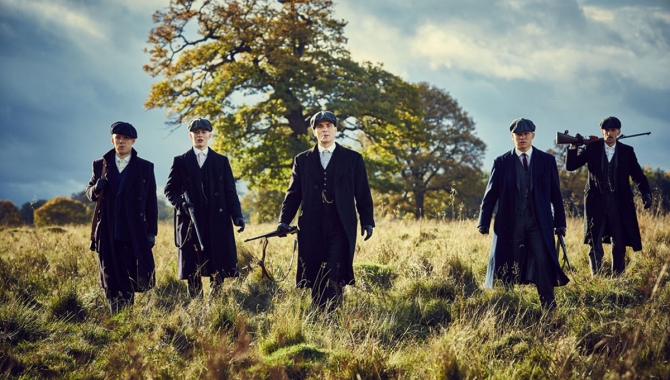
But it’s another level on which you can watch this show, isn’t it? I remember Helen McCrory, before series two aired, describing the storytelling and emphasising the mythological side of it, saying that it isn’t Ken Loach, it isn’t gritty realism, it’s stylised, romantic, mythological.
Yeah. Yes.
Your approach then is to create stories out of real events but to give them that mythological sheen?
Yeah. I’ve got a theory I suppose that first of all, looking at history you can take that as a very basic starting point where you say, okay, this is a period of history and these events happened, you’ve got the events, you can take that, and then you look at real characters. My research wherever possible is looking at real characters, not significant players in historical events but people who were around at the time and to see the true stories of those people. In my opinion, history is chaotic and historians step back twenty years later and make a pattern of it, which is fine, that’s their job and you imagine that everyone living at that time fitted in that pattern which of course they didn’t, but then, if you look at the chaos of it, it’s almost like narrowing your eyes, you can imagine that a cloud looks like a dragon, you can see within that chaos a pattern that you might want to take advantage of. In a sense, the Shelby family story is the story of the working class between the wars or after the war, if you want to look at it that way.
In terms of the symbolism, I think that if you do it right, writing is a bit like dreaming. I’m sure it’s from the same place. You just let it go and it sort of makes sense and it’s real and there’s dialogue—in a dream, everybody can write dialogue! The dialogue’s brilliant in your dreams—so the dialogue’s real, the place is real but in my opinion, there should be something other than that seems to come from somewhere else and the symbolism within Peakies is meant to be like that, it’s meant to be incidental if you like, but it’s actually the main thing, it’s the main pattern of the whole thing. I don’t know if that makes sense!
It makes perfect sense. I’ve never thought of writing like that but it’s an attractive idea. It makes me think of something you said in 2013 when we met just before the first series aired, you said your job was sticking to “pretty much what really happened and making it look good”, which is a humble description, but in the “making it look good”, that’s where you add the extra layer with symbolic imagery.
It’s also trying to be aware of… often in Britain when the working class are summoned for fiction, it’s like ‘isn’t it a shame, isn’t it a pity, isn’t it awful? The terribly poor things’ you know, whereas from within, it’s nothing like that. It’s fantastic, glamorous… it’s terrible and good the same as it is for everybody else but the glamour is the perception of the people within. I imagined seeing these people and the Garrison streets as beautiful and dramatic and romantic because to the people involved, that’s exactly what it is. In the same way as Americans will take the lives of nineteenth century agricultural labours in cowboy films and they won’t say ‘wasn’t it a shame for the cowboys?’ it’s ‘let’s do legends’.
You have the glamour of the Garrison, then a different sort of glamour in series three – what new locations, without revealing too much, are there in series four?
Because of the threat, they are forced back to their roots for what they assume is a temporary period. So these are people who lived that and now are forced back so they’re seeing it in a different way – again, is it possible to escape? In this series, we’ll see a very tangible pulling back of who they are but then I hope at the end will be a surprise that will genuinely—I try and make the surprises genuine rather than ones that have been set up—so at the end of this series there is a big surprise which will jettison us into series five.
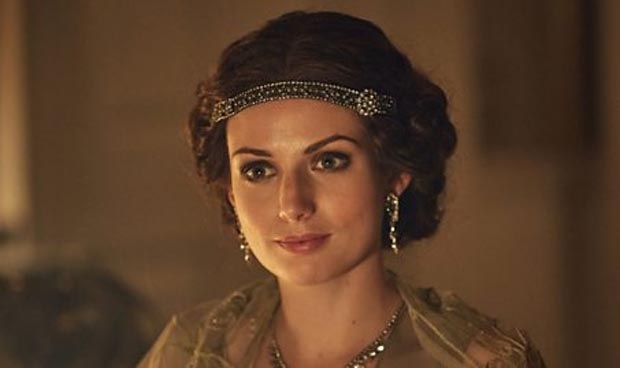
You’ve got a real knack for surprise on this show. It was a surprise to many that series three didn’t go West to Boston and New York, for instance, but you looked to the East with all the crazy Russians!
[Laughs] I wasn’t trying to be difficult, but everyone assumed that’s what would happen because we were talking about prohibition in series two. The problem I have with that is that you’re going into various familiar territories going West. I found it much more intriguing that all of these Russian exiles were in London and Paris and the whole idea of revolution, which is very underestimated now, but at the time in the twenties, there was a sort of assumption that it was going to happen, that’s what’s happening around the world and it’s what the future looked like. I was more interested in that and in four we will see another change of direction.
The crazy Russians and the cursed sapphire… going back to “sticking to what really happened, pretty much”, is that pretty much what really happened?
Mad exiled Russians with a sense of entitlement, definitely! And much madder than anything one would dare put into fiction [laughs]. They used to have the power of life and death over their servants and exercised it, and then they came here and became a real pain for British aristocracy that had to welcome them and tolerate them. There was genuinely a princess living at… what’s the name of that house?
The one by the Thames? I’d have to look it up [Wilderness House next to Hampton Court Palace]
That was all real.
That tunnel though – going back to symbolism, there couldn’t really be a more perfect image for Tommy in series three than him underground with the weight of the Thames threatening to crash down on his shoulders.
Yes. And he’s trying to break in to where the aristocracy are, and he gets in, he actually gets in and he gets away with it but it doesn’t… The idea that his first brush with the aristocracy, they give him a symbol of wealth and power—the blue sapphire—which is cursed! [Laughs] That’s his first encounter with it and he learns it’s actually a curse.
The series three sequence using David Bowie’s Lazarus was my TV moment of the year. Like a lot of people, I’m a huge Bowie fan…
Oh, so am I.
It just felt like the perfect connection between a song and a storytelling moment. I know the background – that he was a fan and sent the album over to you – but can you say how you and [director] Tim Mielants put that sequence together. Why that song?
You know, you’re spoiled for choice. I’m sure you read that before Christmas and New Year Bowie’s business manager came to my house to play me the album because they couldn’t release it in any other way but to sit with him, and I listened to it and thought ‘well, I want to use all of it, it’s so good’ but there was one song. That song. The scene had already been written and so it was a natural fit. We didn’t want to overdo it, suddenly just put loads of Bowie everywhere but that seemed to fit absolutely perfectly. It’s completely humbling that we were told that he really wanted his music used on the series, that was before I knew he was going to… the following Tuesday I was listening to the radio and heard that he’d passed on and I couldn’t believe it.
Because I was saying to his manager, ‘if he wants to come and visit the set, of course, he’s more than welcome, we’d love him to’ and he was saying ‘I don’t think that’s going to be possible’ and I didn’t know. I didn’t have any idea. I’m a massive Bowie fan, always have been.
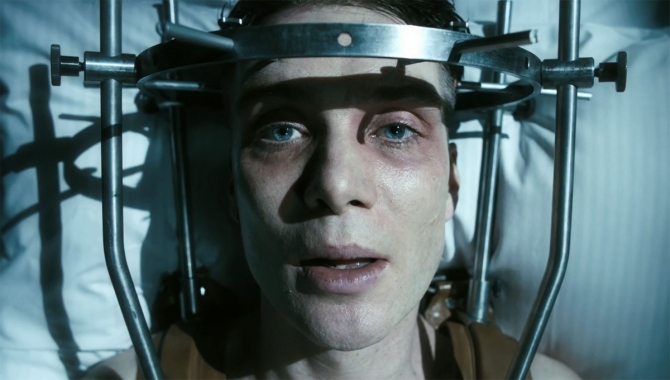
There was just such a synchronicity. “I’m so high it makes my brain whirl”, it felt like—if I believed in a God [laughing]—that was a God-given moment.
The thing that I’ve convinced myself is the case, because there is this theory amongst some Bowie fans that [Bowie’s final album] Black Star… you know there’s an episode of Peakies in series one where Tommy draws a black star in the diary and Grace says ‘What’s that black star?’ and he says somebody’s going to die that day.
[Sigh]
I know! I just can’t believe… that there would be any connection between him and us.
Which year does series four start in? We left them in 1924.
We’re in 1926 in series four, so obviously the General Strike is an issue. I’m planning to jump ahead next series. It depends if next series is the last one. If it is, then I’ve got a plan to jump ahead and then to jump ahead at the very end.
Series five could be the end of the story but it could go on?
It could go on, yeah.
Can we talk about the character of Ada? Like Arthur, the redeemed Christian Arthur, she’s another contradiction being a Marxist living in bourgeois comfort. It feels like she could have a bit more to do in series four and five?
Yes. Again, she was trying to escape via politics, she was trying to get everybody to escape, in other words, change the world. I didn’t want road-to-Damascus conversions or anything like that, she just gets gradually chipped away at by Tommy who brings her back. The wider issue with Ada will only become apparent in series five because—I don’t want to give too much away—but the political element that is completely gone now, even through series four, will re-emerge.
You always said that series three was thematically about power—who has it, who doesn’t, how it affects people—is there an overriding theme for four and five?
There is a sense of perhaps, in series four, it’s about family love and the love between these people but it’s coming at it in a completely different form to the way we’re used to it. I suppose it is about love and examining what the consequences of that are and often, the bad consequences of that.
I was about to say, that sounds surprisingly hopeful for Peakies!
[Laughs] You’ll see! It is about the consequences of that intensity of feeling and how it can be creative and destructive.
I remember Colm McCarthy, your director on series two, saying that once you know what the emotional themes are, everything visually comes out of that. We were talking about the King Midas myth theme of series two with all the gold everywhere… From that emotional theme of the destructiveness of family love then, is there a distinct visual angle for series four?
Yes. It is, in a way, back to the roots, but it’s a new way of looking at what’s there. We looked at it in series one with people who were of that world, we’re now looking at it through people who’ve tried something else. It still has a characteristic feel to it but I think we see more of the function of how that world looks and what I’ve tried to do is to keep the beauty and the drama and enhance it even more if possible in that industrial landscape.
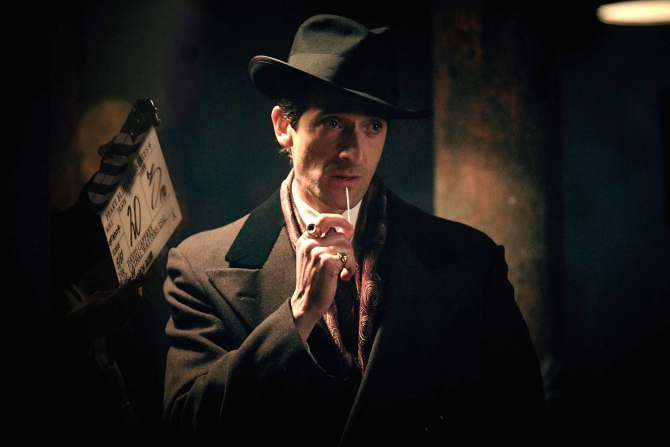
Lastly on series four – Adrian Brody and Aiden Gillan have joined the cast. What would you say they bring to series four?
We try and pick great actors. We get a lot of incoming interest from actors, which is fantastic, people who want to be part of it and we try not to make it ‘spot the star’, we just want people who really can bring something to it. Both of those people are fantastic. And Charlie Murphy as well, is brilliant.
And Snoop Dogg?
Yes, and [joking] he stars in series four… No he doesn’t!
[Laughs] He’s the new lead.
[Laughing] No, he did an Instagram saying he loved the show, this is two years ago, maybe a year and a half ago and he came to London and his agent said he wanted to meet so I spent three hours with him and he was talking about his life and how Peakies reminded him of how he got involved in gang culture, which was amazing. I don’t see the connection but…
How do you approach pacing on the show? Especially in series one and two, it’s incredible the trajectory of how quickly everything progresses. In twelve and a bit hours we see Tommy going from shivering opioid addict to crawling out of that grave and living in that mansion. Do you ever have discussions about burning through too much plot?
I don’t really discuss it with anyone, to be honest, which it’s great to work for the BBC because they leave you alone, they leave you completely alone. My sort of day job is working in Hollywood studios where you do get a lot of input, but with the BBC, they leave you alone. If there is an error in pacing, it’s completely my fault.
What I try and do is to do it in an unconventional way. Normally you tease something, set it up and pay it off. You sort of see it coming, because everybody’s so literate in how drama, television and film work, that they get it straight away. So I try to keep it fast, almost keep it off-balance in a way, and they just get emotion hopefully. Running instead of walking is the way to say it, probably.
I know with Taboo, you described it as “impressionistic” rather than “figurative” in terms of narrative. That’s quite a risky thing to do, but then as you say, you have a very literate drama audience out there – did people respond to Taboo in the way that you wanted?
In a way I didn’t think they would, to be honest! I didn’t know the BBC were going to put it out at nine o clock on Saturday night and I thought ‘oh my God! Have they seen it?’ [laughs] because it’s so out there and it’s very dark and all of that stuff, but the response was amazing. I’m really… [obviously moved] it gives me faith in human nature because people have responded so well to it. And it’s not just an intellectual audience, it’s all sorts of people who really like it.
One of the best responses, what I wanted it to feel like in terms of dialogue and the world, was again that it would be a little bit dream-like and a little bit hypnotic if possible so people don’t quite know why they’re drawn to it. Do you know what I mean? And we were helped by these brilliant directors and also having Tom [Hardy] who is that sort of hypnotic presence anyway, no matter what he does. It’s just trying to make use of that, if possible.
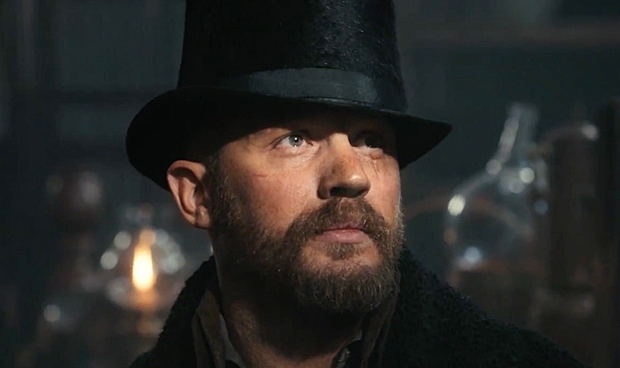
What’s the earliest we can expect to see series two of Taboo?
Of Taboo? I’m just doing it now. I’m trying to write it as quick as I can. I would say we would hope to be shooting it—I don’t know whether this is supposed to be secret or not—early next year. I think.
You mentioned Hollywood and your day job writing for the studios there, it reminded me of something you said all the way back in 2005 talking to The Guardian about one of your plays, I’ve got it here, I’ll read you it. “In Britain, people seem to think that if you’re a working class lad from Birmingham—which I am—what you should be doing is writing about being a working class lad from Birmingham but that’s so limiting.”
[Laughs]
And now you’re four series into an acclaimed, hugely loved story about a working class lad…
…from Birmingham! [Laughs]
You don’t see that as limiting now then?
No, no. What I meant is that you can write about that, but you can also write about other things. What I hope with Peakies is it is a depiction of working class life that isn’t like any other, that isn’t about sympathy or fear or any of those things, it is mythologizing that world. I’d wanted to do Peakies for years before I did, it was always around, but what I mean is it doesn’t mean that you can only write about those things. I think maybe it’s less so now, but there was a fashion for a writer from a regional city being the chronicler of that city and with Peakies that’s a bit what’s happening, but also I hope that the other stuff I do is completely different to that.
Steven Knight, thank you very much!
Peaky Blinders series four starts on Wednesday the 15th of November at 9pm on BBC Two.

